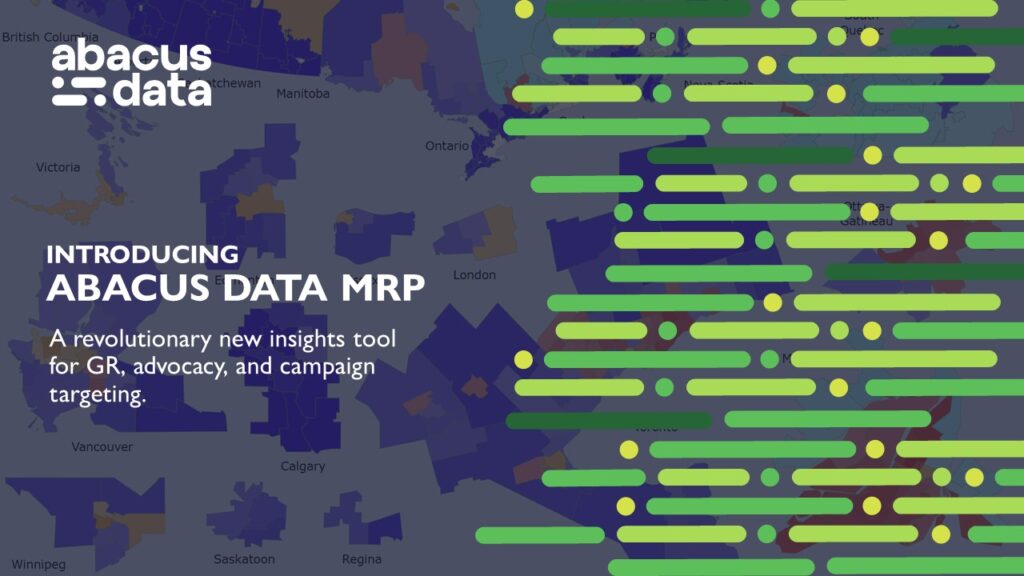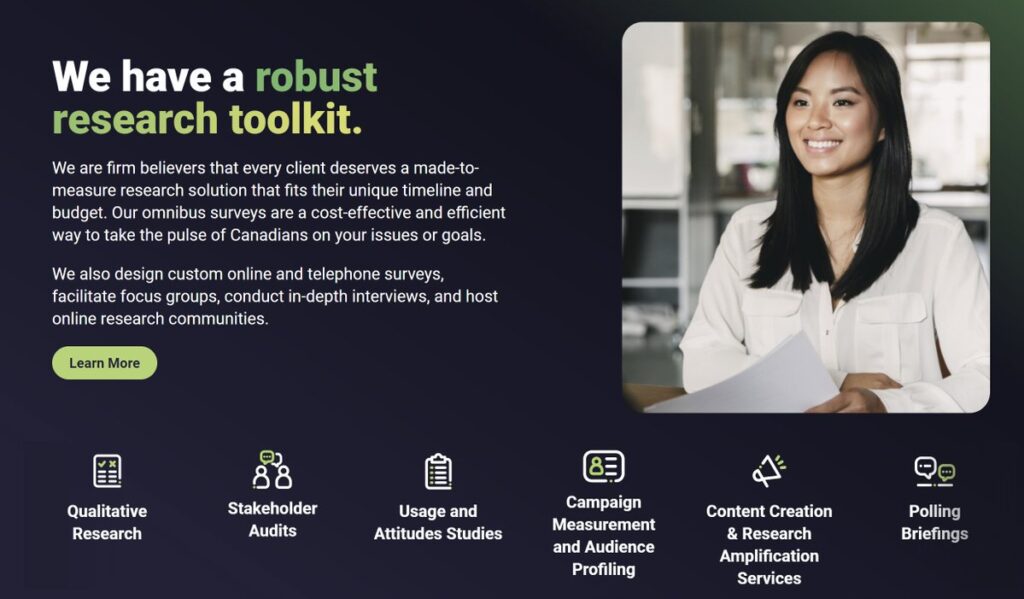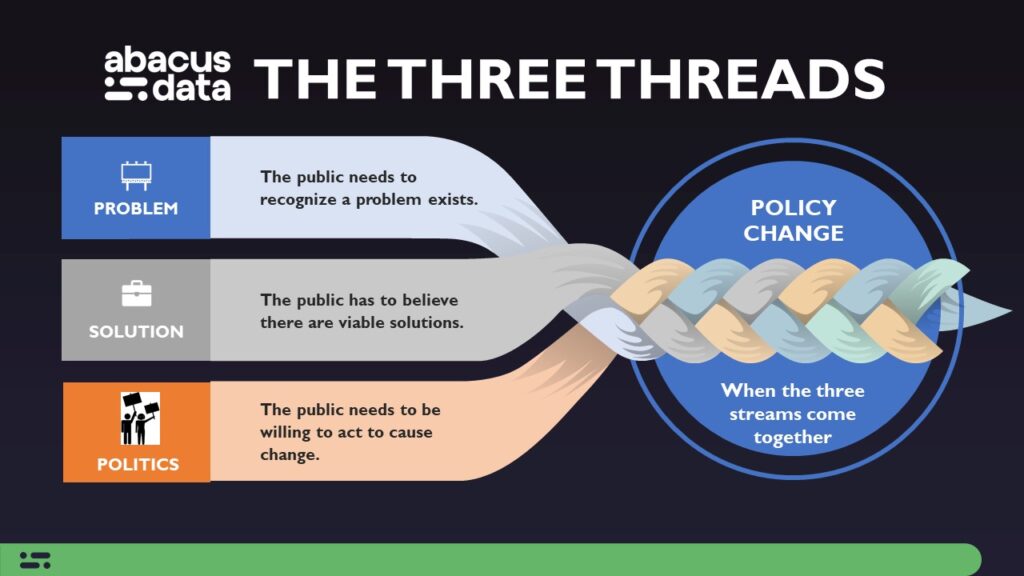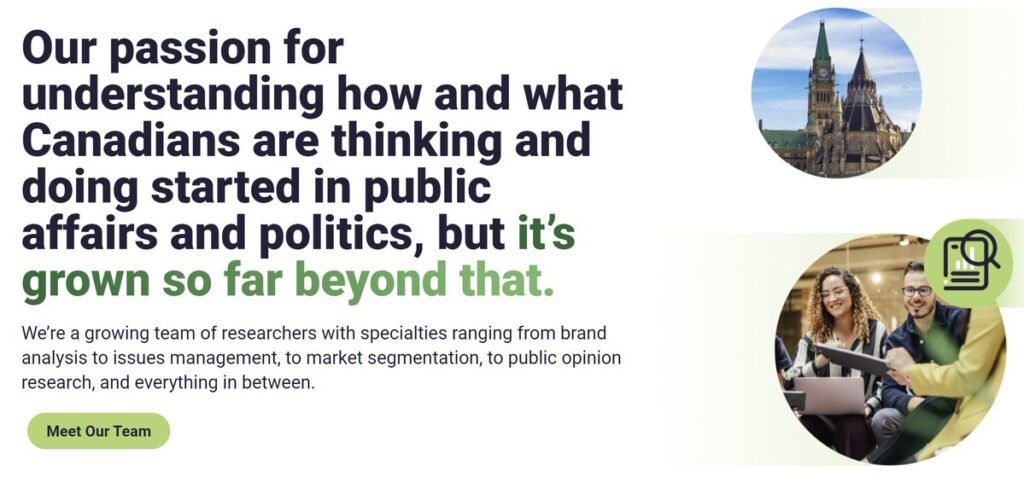Alberta Politics: UCP ahead of NDP by 14-points post-Nenshi leadership victory.
From June 25 and 28, 2024, Abacus Data conducted a survey of 1,000 Albertans aged 18 and over exploring public opinion about provincial politics following Naheed Nenshi’s win as the next leader of the Alberta NDP on June 22.
In this report, we share results of our core political opinion questions which we have tracked over time, delve into public impressions of the provincial government under Danielle Smith’s leadership, examine the key issues currently impacting Albertans, and compare public sentiment of Danielle Smith and Naheed Nenshi.
UCP Holds a 14-point lead over the Alberta NDP
Currently, the UCP have a larger pool of accessible voters (62%) than the the Alberta NDP (48%), highlighting the UCP’s broad appeal to Albertans across the province. This gives the UCP more paths to victory and remains one of its strongest advantages for the Alberta NDP.

If a provincial election were held today, 54% of committed Alberta adults would vote UCP, while 40% would vote for the Alberta NDP, and 6% would choose another party.
Compared to our last survey in March 2024, the UCP’s support is down 1, while the NDP’s support remains unchanged. Since the 2023 provincial election, the NDP has seen a decline of 4-points, whereas the UCP has experienced a 1-point increase. Overall, Nenshi’s victory has not had a noticeable impact on voting intentions in the province.

Regionally, the UCP leads by 4 in Calgary (a smaller margin than we measured in March at 8-points) while the two parties are statistically tied in Edmonton. Outside the two largest cities, the UCP leads by 34-points. Since Nenshi’s victory, the NDP is slightly more popular in Calgary but it’s lead in Edmonton has been reduced from 11-points to 2-points over the UCP.

The UCP continues to hold a wide lead among men (24-points, up from 22 in March), while their lead among women has narrowed to 3 points (down from 7 in March). The UCP maintains a commanding 23-point lead among Albertans aged 60+, whereas the Alberta NDP now has a 5-point lead among Albertans aged 18-29 an improvement since March when we found the UCP ahead by 4.

When asked about their preferred premier, 56% of Albertans favour Danielle Smith, while 44% prefer Naheed Nenshi. Residents in Calgary and Edmonton are evenly split between the two while those outside the big cities prefer Smith to Nenshi by a 2 to 1 margin.


Impressions of Danielle Smith’s Government
Since March, impressions of the provincial government led by Danielle Smith have improved notably. Today, 42% approve of the provincial government’s job performance (up 10 since March) while 39% disapprove. However, those who strongly disapprove (24%) is more than double those who strongly approve (11%).

In Calgary, the Smith government’s net approval rating is +3, up from -13 in March. In Edmonton, it stands at -12, an improvement from -20 in March. In the rest of the province, the approval rating has increased to +15 from +11 in March. These figures indicate that approval of Smith’s government has risen across the province since March of this year, although Edmonton still presents a net negative approval rating.

Mood of the Province + Top Issues Facing Alberta Today
Today, 49% of Albertan’s believe that the province is off on the wrong track (largely unchanged from March) while 35% believe the province is headed in the right direction. For comparison, nationally, 25% of Canadians think the province is headed in the right direction.


It is interesting that more Albertans approve of the provincial government’s performance than think the province is headed in the right direction. In fact, 17% of those who think the province is off on the wrong track approve of the provincial government. It is likely these people blame something else (think federal government or global events) for the direction of the province rather than the provincial government.
The cost of living is by far the most important issue for Albertans today. 3 in 4 rate it as one of their top 3 issues. Healthcare, housing, taxes, and the economy round out the top 5.
Interestingly, despite Calgary’s state of emergency related to a major watermain break, only 8% of Albertans rate “infrastructure in Alberta’s cities” as a top issue and Calgarians are no more likely to rate it as a top issue than those in other parts of the province.

Albertans were asked which party leader – Danielle Smith or Naheed Nenshi – they trust most to deal with each issue.
Danielle Smith has a wide lead on who Albertans trust most to defend Alberta against the federal government (+33), protecting the rights of gun owners (+34), managing the economy (+17), keeping taxes low (+11), business attraction (+18), the cost of living (+7), and infrastructure (+7).
Naheed Nenshi leads on climate change (+11), protecting the environment (+11), wealth inequality (+8), healthcare (+10) and education (+7).
Smith and Nenshi are tied on education (38% each).

Impressions of Party Leaders
To assess how well people know Naheed Nenshi as he takes over the leadership of the Alberta NDP from Rachel Notley, we asked people to rate their knowledge of both Smith and Nenshi.
Not surprisingly, Danielle Smith is better known than Naheed Nenshi. When we combine those who say they know the leaders pretty or very well, Smith’s familiarity score is 73% while Nenshi’s is 53%. Despite being Calgary’s Mayor for more than decade, many Albertans don’t know much about Nenshi and that’s very clear when we look at the region breakouts.
In Calgary, 73% say they know Nenshi at least pretty well compared with only 44% in the rest of the province.



at polling for public affairs and advocacy.
Both political party leaders have fairly good personal images (at least compared to political leaders federally or in other provinces. Danielle Smith has a net favourable impression of +2 with 41% having a positive view of her and 39% having a negative view.
In comparison, Naheed Nenshi’s net favourable is even with 32% having a positive view and 32% having a negative one.

Premier Smith’s net favourability is highest in communities outside Calgary and Edmonton (+11), among those aged 45-59 (+20), and those aged 60 and older (+12). Conversely, Naheed Nenshi’s net favourability is greatest in Calgary (+21) and Edmonton (+5), as well as among those aged 18-29 (+7). Premier Smith garners the highest favourability among older residents and rural communities outside Calgary and Edmonton, while Naheed Nenshi’s strongest support comes from younger adults and urban areas like Calgary and Edmonton.


Respondents were also asked to rate Danielle Smith and Naheed Nenshi on various leadership qualities. Smith was more likely to be seen as a strong leader (53%) and someone who stands up for Albertans (50%) compared to Nenshi.
In contrast, Nenshi was more likely to be viewed as intelligent (57%) and kind and compassionate (48%) compared to Smith. Additionally, Nenshi was perceived as someone motivated by genuine concern for their community (42%) and understanding of the challenges faced by Albertans (40%). These findings indicate that Albertans perceive Danielle Smith as a strong leader, while they see Nenshi as empathetic and in touch with the personal aspects of politics.

However, when we focus on only those who know each leader at least “pretty well”, we find Nenshi holding a considerable advantage over Smith. This suggests that as people get to know Nenshi better across the province, he has the potential to shift impressions of the party and maybe increase the number of Albertans willing to consider voting NDP.
In other words, there’s a chance that the more Albertans get to know Nenshi, the more they will like him.

NDP Divorce? Should the AB NDP split from the federal party?
After being elected as the new leader of the Alberta NDP, Naheed Nenshi indicated his intention to ask party members about splitting from the federal party, a key issue in his campaign.
When asked, 49% of Albertans support the Alberta NDP severing ties with the federal party, while 21% oppose it. This decision is strongly supported by accessible Alberta NDP voters (51%), Alberta NDP supporters (49%), and even federal NDP supporters (43%). This shows a significant portion of Albertans favor more autonomy for the provincial party.


The Upshot
Naheed Nenshi’s landslide victory for the Alberta NDP leadership has not had a major impact on public opinion in Alberta but it has shifted two aspects of political opinion: the Alberta NDP is more competitive in Calgary but has less of a dominant lead in Edmonton.
Nenshi takes over the Alberta NDP at a time when Danielle Smith and her government are relatively popular (at least compared to other incumbent governments in Canada). More people have a positive view of Premier Smith than a negative one. The UCP has a big advantage on several of the top issues including the cost of living, the economy, and taxes and is tied with the NDP on housing. Healthcare remains a vulnerability for the UCP and an opportunity for Nenshi and the NDP.
Perhaps more concerning for Nenshi is the substantially larger pool of accessible voters available to the UCP than the NDP. The UCP’s advantage outside of two largest cities remains a big hurdle for a future NDP government and changing the public’s perception of the NDP is going to be an important step in fixing that. There’s broad support for splitting the provincial NDP from the federal party, so that could be a first step in that process.
But this poll also confirms that Nenshi could be threat to the UCP. Those who know Nenshi like him which is probably why the UCP has already started trying to define him to the close to half of Albertans who don’t know the former Calgary mayor all that well.
It’s still too early to determine Naheed Nenshi’s influence on Albertan politics, but early signs indicate he holds promise as a worthy challenger to Danielle Smith and the UCP. How effectively he connects on key issues for Albertans, is able to shift perceptions about the party itself, and increases his visibility across the province will be pivotal in shaping voter opinions moving forward.
Methodology
The survey was conducted with 1,000 Canadian adults from June 25 to 28, 2024. A random sample of panelists were invited to complete the survey from a set of partner panels based on the Lucid exchange platform. These partners are typically double opt-in survey panels, blended to manage out potential skews in the data from a single source.
The margin of error for a comparable probability-based random sample of the same size is +/- 3.31%, 19 times out of 20.
The data were weighted according to census data to ensure that the sample matched Canada’s population according to age, gender, educational attainment, and region.
This survey was paid for by Abacus Data Inc.
Abacus Data follows the CRIC Public Opinion Research Standards and Disclosure Requirements that can be found here: https://canadianresearchinsightscouncil.ca/standards/
ABOUT ABACUS DATA
We are Canada’s most sought-after, influential, and impactful polling and market research firm. We are hired by many of North America’s most respected and influential brands and organizations.
We use the latest technology, sound science, and deep experience to generate top-flight research-based advice to our clients. We offer global research capacity with a strong focus on customer service, attention to detail, and exceptional value.
And we are growing throughout all parts of Canada and the United States and have capacity for new clients who want high quality research insights with enlightened hospitality.
Our record speaks for itself: we were one of the most accurate pollsters conducting research during the 2021 Canadian election following up on our outstanding record in the 2019, 2015, and 2011 federal elections.
Contact us with any questions.
Find out more about how we can help your organization by downloading our corporate profile and service offering.
